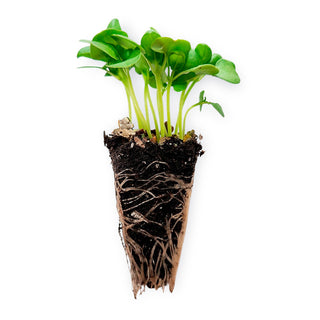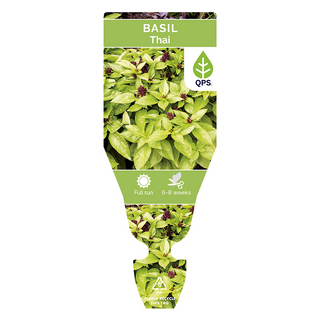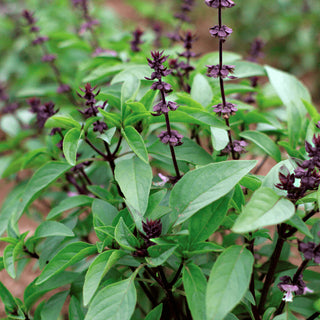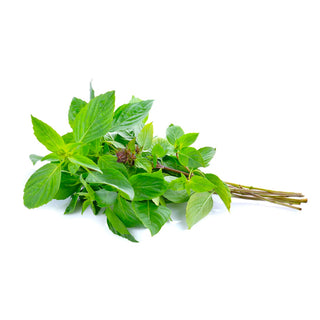Thai Basil Seedlings
- Unit price
- / per
Thai basil, also known as "horapa" in Thai cuisine, is a popular herb with a distinct and aromatic flavour. This basil variety is native to Southeast Asia and is a staple ingredient in Thai, Vietnamese, and other Southeast Asian cuisines.
The leaves of Thai basil are deep green and have a unique anise-like, licorice flavour with a hint of spiciness. Unlike sweet basil, Thai basil leaves are narrow and pointed, and they feature a slightly serrated edge. The plant itself has purple stems, which add a pop of colour to gardens and culinary dishes.
Thai basil is a versatile herb used in a wide range of dishes, including curries, stir-fries, soups, and salads. It's often added fresh as a finishing touch to enhance the aroma and flavour of the dish. Thai basil's aromatic and slightly peppery notes make it an essential component of many Thai classics, such as Pad Krapow and Green Curry.
Apart from its culinary uses, Thai basil is also valued for its potential health benefits, including anti-inflammatory and antioxidant properties. Its distinct flavour and culinary versatility have made it a beloved herb both in its native region and around the world.
🌱 Seedlings Height: Thai basil seedlings typically range in height from 10cm to 20cm, including the root system.
📏 Space plants: When planting Thai basil, it's recommended to space the plants approximately 20cm to 30cm apart to allow them room to grow and thrive.
🥗 Harvest Time: Thai basil can usually be harvested after 8 to 10 weeks of growth, although the exact timing may vary depending on your location and weather conditions. It's best to harvest the leaves when they are young and tender for the most flavorful results.
Medicinal Uses: Thai basil has been used in traditional medicine in Southeast Asia for its potential health benefits. It is believed to have properties that can help with digestion, relieve coughs, and even reduce stress.
Insect Repellent: In some cultures, Thai basil plants are grown near doors and windows as a natural insect repellent. The aroma of Thai basil is said to deter flies and mosquitoes.
We are a proudly Australian-owned family business dedicated to providing high-quality seedlings, seeds, fruit trees, native plants, and indoor ornamentals. We offer express shipping to SA, VIC, QLD, and NSW, with local delivery and pickups available by arrangement. Unfortunately, due to restrictions, we are unable to send to TAS, WA, or NT. For OH&S and biosecurity reasons, farm tours and direct purchases are not available, and pickups can only be made at our farm gate entrance. We deeply value our loyal customers and thank you for your continued support.
Thai Basil Seedlings
- Unit price
- / per
Adding product to your cart
You may also like
Thai basil, also known as "horapa" in Thai cuisine, is a popular herb with a distinct and aromatic flavour. This basil variety is native to Southeast Asia and is a staple ingredient in Thai, Vietnamese, and other Southeast Asian cuisines.
The leaves of Thai basil are deep green and have a unique anise-like, licorice flavour with a hint of spiciness. Unlike sweet basil, Thai basil leaves are narrow and pointed, and they feature a slightly serrated edge. The plant itself has purple stems, which add a pop of colour to gardens and culinary dishes.
Thai basil is a versatile herb used in a wide range of dishes, including curries, stir-fries, soups, and salads. It's often added fresh as a finishing touch to enhance the aroma and flavour of the dish. Thai basil's aromatic and slightly peppery notes make it an essential component of many Thai classics, such as Pad Krapow and Green Curry.
Apart from its culinary uses, Thai basil is also valued for its potential health benefits, including anti-inflammatory and antioxidant properties. Its distinct flavour and culinary versatility have made it a beloved herb both in its native region and around the world.
🌱 Seedlings Height: Thai basil seedlings typically range in height from 10cm to 20cm, including the root system.
📏 Space plants: When planting Thai basil, it's recommended to space the plants approximately 20cm to 30cm apart to allow them room to grow and thrive.
🥗 Harvest Time: Thai basil can usually be harvested after 8 to 10 weeks of growth, although the exact timing may vary depending on your location and weather conditions. It's best to harvest the leaves when they are young and tender for the most flavorful results.
Medicinal Uses: Thai basil has been used in traditional medicine in Southeast Asia for its potential health benefits. It is believed to have properties that can help with digestion, relieve coughs, and even reduce stress.
Insect Repellent: In some cultures, Thai basil plants are grown near doors and windows as a natural insect repellent. The aroma of Thai basil is said to deter flies and mosquitoes.
We are a proudly Australian-owned family business dedicated to providing high-quality seedlings, seeds, fruit trees, native plants, and indoor ornamentals. We offer express shipping to SA, VIC, QLD, and NSW, with local delivery and pickups available by arrangement. Unfortunately, due to restrictions, we are unable to send to TAS, WA, or NT. For OH&S and biosecurity reasons, farm tours and direct purchases are not available, and pickups can only be made at our farm gate entrance. We deeply value our loyal customers and thank you for your continued support.
You may also like
You may also like
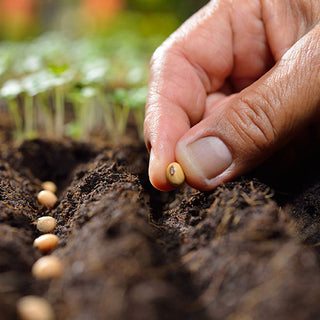
CERTIFIED ORGANIC
Commercial-grade certified organic seed boasts top-notch germination rates and yields, perfect for Aussie growers
Testimonials

QPS offers a wide selection of high-quality seedlings, including herbs, vegetables, and ornamental plants. They are known for their robust health and diverse variety, catering to all gardening preferences. With careful packaging and clear care instructions, Quality plants & seedlings ensures their plants arrive in good condition. They prioritise customer service and sustainability, making them a trusted choice for gardeners of all levels aiming to create thriving gardens.

Choosing QPS for my certified organic seeds was a game-changer for my garden. The variety of herbs, vegetables, and ornamental plants available exceeded my expectations, all grown with meticulous organic practices. The seeds arrived promptly and were clearly labeled with planting instructions, making the process smooth and stress-free. I've been impressed with the high germination rates and the healthy growth of the plants, reflecting QPS's commitment to quality. For anyone looking to start or expand an organic garden, QPS is my go-to choice for reliable, sustainable seeds.
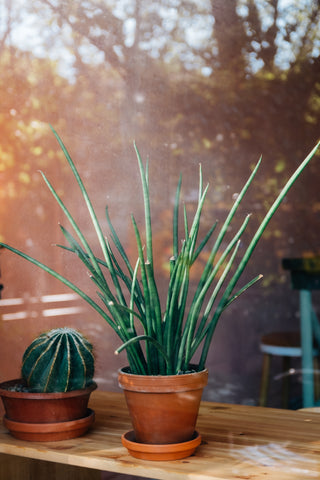
Sourcing wholesale indoor plants from QPS has been a fantastic experience for my projects as a landscape designer. Their extensive selection of indoor plants is of exceptional quality, perfect for creating vibrant interior spaces. Each plant arrives well-packaged and in excellent condition, reflecting QPS's attention to detail and commitment to customer satisfaction. Their competitive wholesale pricing makes them a preferred supplier for large-scale projects. I highly recommend Quality Plants & Seedlings to fellow professionals and enthusiasts seeking reliable, top-notch indoor plants for their designs.

Choosing QPS for seedlings at our school has been a great decision. Their diverse range includes everything from vegetables to ornamental plants, all nurtured with care using organic practices. The seedlings arrived promptly and were well-packaged with clear instructions, making them easy for students to handle and plant. We've been pleased with the robust health and rapid growth of the plants, which has enhanced our educational gardening initiatives. QPS's commitment to quality and sustainability makes them an ideal choice for schools looking to cultivate a green thumb in students.
Recommended products
We offer express postage straight to your door, servicing SA, VIC, NSW, and QLD. Click & Collect is also available—please note, no walk-ins allowed.
Our seedlings ensure seamless transplanting with minimal crop stress for optimal growth and yield.
Our Australian customers trust us for seedlings that deliver high yields and strong root growth, proven by their loyalty and repeat purchases.
We are PCI compliant by default so you can keep payment info and business data safe.

🌱 In the Garden with Christie Cooper – Aussie Green Thumb Reporter



